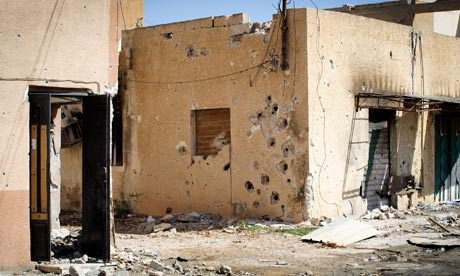Libya: Gaddafi forces 'using cluster bombs in Misrata'
Human Rights Watch say Gaddafi's army has fired the weapons, which cause massive damage and are banned in most states
- guardian.co.uk,
- Article history

Heavy gunfire pockmarks houses in Misrata, Libya. Witnesses say Gaddafi's forces have fired cluster bombs into the city. Photograph: Phil Moore/AFP/Getty Images
Forces loyal to Muammar Gaddafi have fired cluster bombs into residential areas of the besieged city of Misrata, according to witnesses.
Human Rights Watch reported that four cluster bombs exploded in the city on Thursday and Friday, and two Libyan residents of Misrata told the Guardian that they suspected the munitions were being used.
Cluster bombs, banned by most countries in the world, explode in midair, indiscriminately throwing out dozens of high-explosive bomblets which cause widespread damage and injuries over a large area. The submunitions often fail to explode on impact but detonate when stepped on or picked up.
The claims came as the leaders of US, Britain and France committed their countries to pursue military action until Colonel Gaddafi has been removed from power. In a joint letter, Barack Obama, David Cameron and Nicolas Sarkozy described the onslaught on Misrata a "medieval siege … to strangle its population into submission".
More than 100 government rockets were also fired on Misrata on Friday during a second day of heavy bombardment. Eight people were killed, according to rebels, who said government forces had reached the city's centre.
HRW condemned the use of cluster munitions, especially in residential areas. "They pose a huge risk to civilians, both during attacks, because of their indiscriminate nature, and afterward because of the still-dangerous unexploded duds scattered about," said Steve Goose, HRW's arms division director.
It said that, based on its examination of submunition found in Misrata, the bombs originated in Spain. "The cluster munition is a Spanish-produced MAT-120 120mm mortar projectile, which opens in mid-air and releases 21 submunitions over a wide area. Upon exploding on contact with an object, each submunition disintegrates into high-velocity fragments to attack people and releases a slug of molten metal to penetrate armored vehicles," it said in a statement.
The US secretary of state, Hillary Clinton, speaking after a meeting of Nato foreign ministers in Berlin, said she was not aware of the reports, but remarked, "I'm not surprised by anything that Colonel Gaddafi and his forces do."
She added: "That is worrying information. And it is one of the reasons the fight in Misrata is so difficult, because it's at close quarters, it's in amongst urban areas and it poses a lot of challenges to both Nato and to the opposition."
Mohamed, a rebel opposition spokesman in Misrata, told the Guardian by Skype that he had heard "one big explosion followed by many smaller ones. It sounds like cluster bombs".
He also reported seeing victims of what he called "candy bombs", describing them as "something that resembles a pretty bottle. You pick it up, it explodes and kills you."
Aiman Abushahma, a doctor at a Misrata hospital, said medics were seeing people with injuries consistent with cluster bombs. "We never saw these injuries before. We need experts to assess [the weaponry]," he said.
HRW said cluster bombs had fallen around 1km from the frontline in Misrata. It could not confirm whether civilians had been killed or injured by the munitions.
It quoted two Misrata ambulance drivers, who said they had witnessed cluster strikes on Wednesday and Thursday.
Ibrahim Abuwayfa saw an explosion in the air and "little flames" coming down at about 7pm on Wednesday. "One of the objects landed a few metres away on a residential wall and it exploded when it hit and then shrapnel flew out," he said.
Waleed Srayti said he saw a cluster munition strike at around 11am on Thursday. "I was in the streets behind the vegetable market," he said. "A big battle was going on in Tripoli Street at the vegetable market. I heard a noise and about nine or 10 things started popping out of the sky over the market. I just saw the pops in the air. I saw white smoke coming down."
Government spokesman Moussa Ibrahim denied that Libya was using cluster bombs. "We can never do this, morally, legally. We challenge them [HRW] to prove this. We know the international community is coming en masse to our country. We're not using them."
Libya has not signed the Convention on Cluster Munitions, which bans the use, production, stockpiling and transfer of cluster munitions, and requires states to destroy stockpiles.
Nenhum comentário:
Postar um comentário